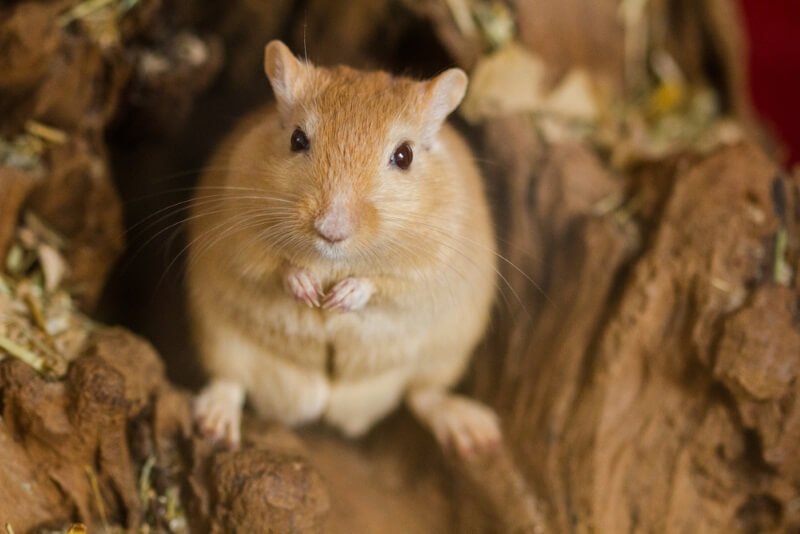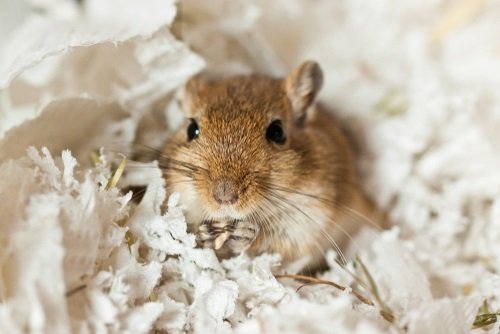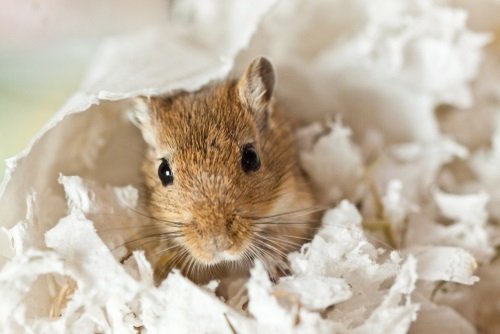How To Care For A Gerbil?
This page contains affiliate links. We may earn money or products from the companies mentioned in this post through our independently chosen links, which earn us a commission. Learn More
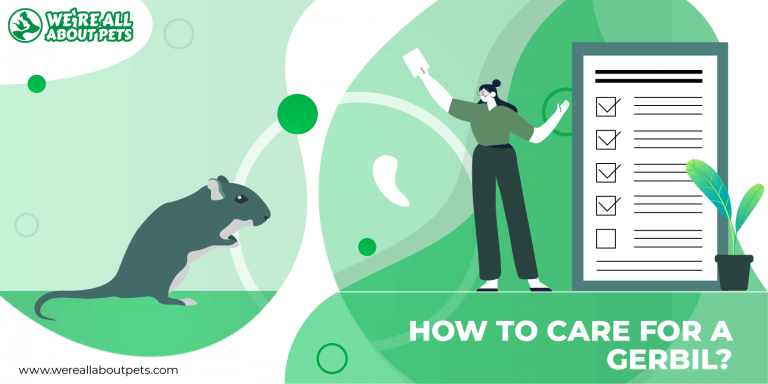
General Stats:
- Pet Type: Small Pet
- Size: Up to 4 inches
- Diet: Omnivore
- Lifespan: 5 to 7 years
A popular choice as a child’s first pet, gerbils are small, furry animals that are generally fairly easy to care for.
These little rodents are active curious by nature – they are also very social animals. With regular handling, gerbils can become quite tame.
Though caring for a gerbil is not necessarily difficult, it is important to know what your gerbil needs and to make sure you provide it. Here’s what you need to know about caring for your pet gerbil.
Quick Navigation
Habitat Setup For Gerbils
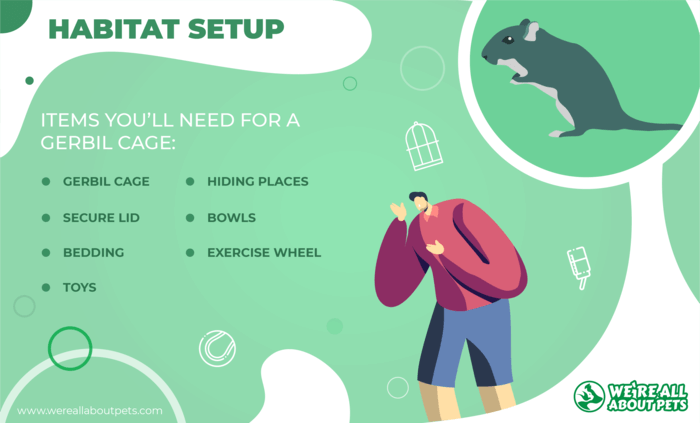
Though gerbils only grow to a length around 4 inches (plus 3 to 4 inches of tail), they are very active little animals. Your gerbil will spend the majority of its life in its cage, so it’s important to make sure you provide your pet with plenty of space.
Your gerbil cage should be no smaller than 12x24x12 inches, though bigger is always better when it comes to your gerbil’s cage. This should be large enough for a pair of gerbils, but if you keep a larger colony, you’ll definitely need a bigger cage.
Here are some of the items you’ll need for a gerbil cage:
- Gerbil Cage – A 10-gallon aquarium is a good starter cage for a gerbil, though you can certainly go bigger. Wire cages are also an option and may provide better ventilation, but make sure the holes aren’t big enough for your gerbil to escape or get his head stuck in.
- Secure Lid – Gerbils are very curious, so make sure your cage has a snug lid to prevent escape.
- Bedding – Wood shavings (like aspen shavings) are great for gerbils as long as they aren’t too coarse – your gerbil should be able to burrow on it. Just avoid pine or cedar shavings because the natural oils can irritate your gerbil’s respiratory system and cause sneezing or difficulty breathing.
- Toys – Chew toys are a must for gerbils, so provide a variety of options. Wooden toys are best (as long as it is untreated and non-toxic) – avoid plastic because it could harm your pet.
- Hiding Places – Your gerbil needs places to hide and sleep, so provide a few options. Something as simple as a terracotta flower pot works well because your pet can fill it with bedding.
- Bowls – Your gerbil needs fresh food and water every day, so provide a small bowl for a food dish and a water bottle filled with fresh water.
- Exercise Wheel – Gerbils are very active animals, so provide an exercise wheel in the cage.
When setting up your gerbil’s cage, keep in mind that gerbils love burrowing. Fill the cage with several inches of soft bedding for your gerbil to dig around in and provide an exercise wheel, hiding places, and your pet’s water bottle and food bowl.
To give your gerbil some mental stimulation, be sure to include chew toys. Cardboard tubes (like paper towels or toilet paper tubes) are a great addition as well – your gerbil will love playing in them and they are safe for chewing.
Also Read: The Cost of Owning a Gerbil
Gerbil Diet
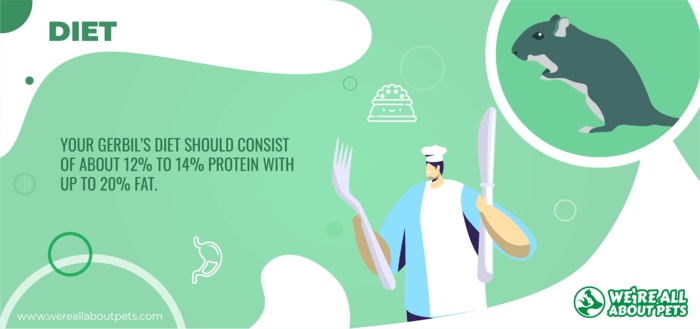
In the wild, gerbils feed primarily on the seeds of grasses and other plants as well as bulbs, leaves, and herbs. Pet gerbils can be fed in two ways, depending how much effort you’re willing to put in.
One option is to feed your gerbil a varied mix of seeds supplemented with fresh food like vegetables and fruits. It’s important to monitor the fat content of the seeds and to make sure your gerbil gets a wide variety.
If you’re concerned about balanced nutrition, a commercial gerbil food pellet may be the better option since these are formulated to provide for the nutritional needs of pet gerbils.
Here are some quick facts about the ideal gerbil diet:
- Your gerbil’s diet should consist of about 12% to 14% protein with up to 20% fat.
- You should supplement your gerbil’s diet with small amounts of fresh fruit and veggies.
- Watch the fat content of your gerbil’s diet to prevent unhealthy weight gain.
- Limit your gerbil’s intake of high-fat seeds like sunflower seeds.
- You can offer occasional treats like dried fruit or even dried mealworms.
The amount you feed your gerbil may change depending on its age, but most gerbils only eat about 1 tablespoon of food per day with small amounts of fresh food.
In addition to meeting your gerbil’s dietary needs, be sure to provide unlimited access to clean water as well. A small pet water bottle is perfectly adequate for gerbils. Just be sure to clean it with warm soapy water on a daily basis and refill with fresh water.
Also Read: What Do Gerbils Eat?
Gerbil Veterinary Care
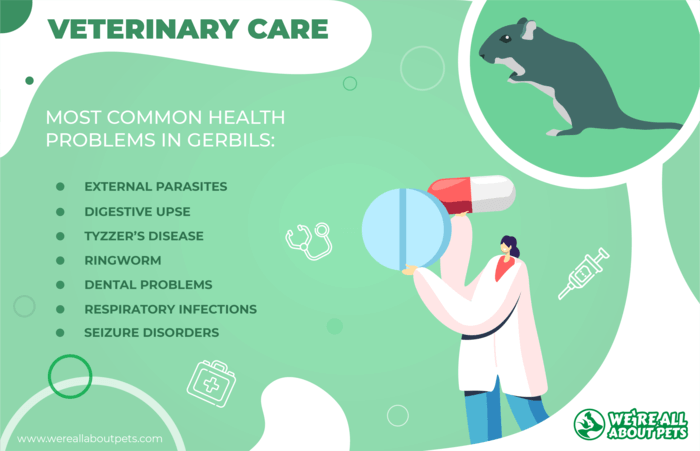
With proper gerbil care, your new pet should live 5 to 7 years. The key to keeping your gerbil healthy is to keep up with routine veterinary care.
You should take your pet to the vet within a few weeks of bringing him home and then plan on annual visits.
Not all veterinarians care for gerbils, so you may need to find an exotics vet. You should expect to pay $35 to $50 for the visit, plus the cost of any additional testing or treatment.
Fortunately, gerbils do not require vaccinations. Your gerbil will only need treatment if it gets sick.
Here are some of the most common health problems in gerbils:
- External parasites
- Digestive upset
- Tyzzer’s disease
- Ringworm
- Dental problems
- Respiratory infections
- Seizure disorders
As long as you give your gerbil a healthy diet and provide a clean environment, he should stay healthy.
Some pet owners take out pet insurance to help offset the cost of emergency vet care, but this generally isn’t necessary for gerbils. If your gerbil gets so sick that he needs to go to the emergency vet, it is unfortunately probably past the point where he can be treated.
Gerbil Fun Facts
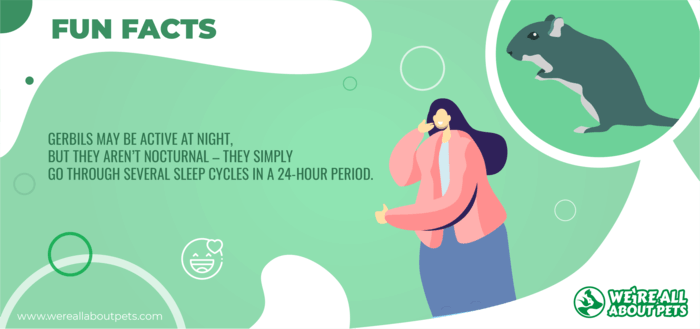
- Gerbils may be active at night, but they aren’t nocturnal – they simply go through several sleep cycles in a 24-hour period.
- Though gerbils do not hibernate in the wild, they will sometimes go into a hibernation-like state of lethargy when exposed to extreme cold.
- Gerbils have very short gestation periods – they are pregnant for only 24 days and can mate again very shortly after giving birth.
- In the wild, gerbils may only live 2 to 3 years, but they tend to live 5 to 7 years in captivity.
- Gerbils have small, sharp teeth that can hurt if they bite – the good news is gerbils are easy to tame and don’t generally bite unless they feel threatened.
- Like other small rodents including hamsters, rats, and mice, gerbils have 16 teeth (a guinea pig has 20 and a rabbit 28).
- Though they feed primarily on seeds and other vegetation, gerbils are technically omnivores – they occasionally eat insects and will accept small amounts of meat or egg.
- Much like the chinchilla, it’s better to give a gerbil a sand bath than a traditional bath – if you try to bathe your gerbil in water it will likely cause stress.
If you’re looking for a low-maintenance pet, the gerbil could be the perfect fit. You can easily find these little rodents at the pet store for an affordable price and, when it comes to pet care, gerbils are fairly simple.
Just be sure to stock up on everything your gerbil needs before you bring him home.
Frequently Asked Questions
How long do gerbils live?
Gerbils live an average of 5 to 7 years. With proper care, however, some have been known to live as long as 8 years.
How much do gerbils cost?
Being a small pet, gerbils are much more affordable than cats or dogs but they do have certain associated costs. Buying a gerbil may cost you less than $10, but you should plan to spend about $25 to $75 on a cage and another $30 to $75 in cage accessories. In terms of annual costs, be sure to factor in monthly costs for food and bedding as well as veterinary care.
How big do gerbils get?
The gerbil is a small animal, growing to an average of 4 inches in body plus another 4 inches in tail length.
What do gerbils eat?
In the wild, gerbils eat the seeds of various grasses as well as leaves, herbs, and bulbs. Pet gerbils can be fed a diet of varied seeds supplemented with fresh fruits and vegetables. Another option is to feed your gerbil a commercial gerbil diet of nutritionally balanced pellets supplemented with fresh food.
Are gerbils good pets?
Gerbils make very good pets if you’re able to provide for your gerbil’s needs. They do not take up a great deal of space, their diet is fairly easy to provide for, and they can be tamed with frequent handling. Many people find gerbils to be a great beginner pet for older children.
Are gerbils messy?
Any mess your gerbil makes will be contained in its cage. As long as you clean the cage regularly, it shouldn’t become a problem.
Where do gerbils come from?
Most gerbils kept as pets are bred from Mongolian gerbils which come from Africa and Asia.
Do gerbils bite?
Gerbils can bite if they feel threatened, but they generally respond well to gentle handling. The more often you handle your gerbil, the tamer it will become.
Do gerbils sleep?
Yes, all animals sleep. Gerbils are not nocturnal, but they go through several sleep cycles throughout a 24-hour period. This being the case, they are often active during the night.
How long are gerbils pregnant for?
Rodents are known for being prolific breeders and the gerbil is no exception. If you aren’t careful to keep males and females separated, you shouldn’t be surprised if you wake up to a litter of baby gerbils one day. Female gerbils stay pregnant for about 24 days and birth 1 to 8 pups at a time.






